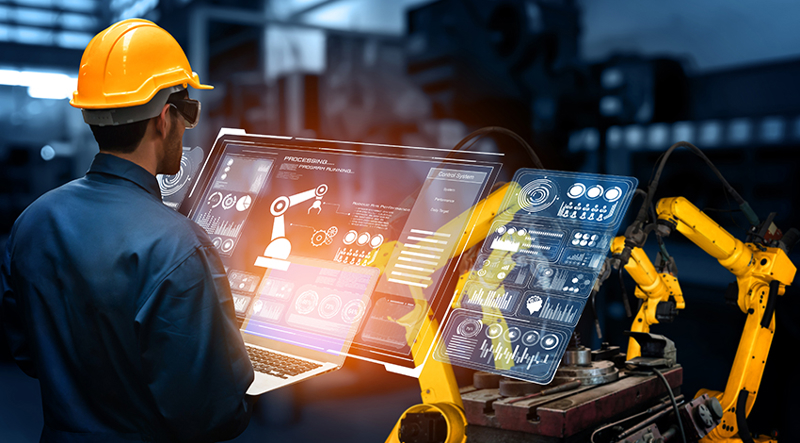Artificial intelligence is transforming nearly every aspect of daily life, from accounting to warehousing and many other industries in between. Incorporating AI into processes has enabled employees to concentrate on value-added activities instead of repetitive and mundane tasks. Manufacturing companies are beginning to harness AI's capabilities to enhance operations, reduce waste and optimize resources.
AI innovation can be leveraged in various ways on a manufacturing plant floor. For example, rather than recording production figures, scrap and completed parts by hand on hourly tracking boards throughout the facility, we utilized AI-driven image recognition to automatically capture the necessary data to support Lean operations.
Innovative trends utilizing AI are appearing in multiple fields within manufacturing. Here are eight examples of manufacturing companies that are leveraging AI to enhance their operations, as well as steps you can take to apply this technology effectively in your own organization.
AI uses cases
- Predictive Maintenance
AI-based analytics can foresee equipment malfunctions in advance, reducing downtime and maintenance expenses. These AI models analyze historical and real-time data from machine sensors to identify patterns of potential failures, allowing for pre-emptive measures before failures can occur. GE applies AI for predictive maintenance in its factories and with clients. Their Predix platform uses machine learning to foresee equipment failures in manufacturing and energy, significantly cutting downtime and operating expenses. - Supply Chain Optimization
Artificial intelligence can improve supply chain management by forecasting demand, streamlining inventory levels and determining the most efficient logistics routes. This can lead to cost reductions, less waste and better delivery times. Amazon’s fulfillment centers leverage AI to enhance inventory management and streamline the supply chain. Machine learning can predict demand, automate restocking and optimize delivery routes for quick and efficient service. - Augmented Reality
AI-driven augmented and virtual reality (VR) tools can aid in training, maintenance and remote support by offering immersive experiences that help improve comprehension and performance of intricate tasks. Lockheed Martin has utilized VR to train their technicians and engineers, resulting in significant reductions in training duration. For instance, the time required to train technicians working on the Orion spacecraft has been considerably shortened. - Waste Reduction
AI can assist in pinpointing inefficiencies within production processes, offering recommendations to minimize waste, optimize resource utilization and bolster sustainability initiatives following global environmental standards. Procter & Gamble leverages artificial intelligence to enhance its production lines, aiming to minimize waste and lower energy usage. These AI models pinpoint inefficiencies and recommend process enhancements, assisting the company in reaching its sustainability objectives. - Improved Decision Making
AI can deliver data-driven insights that enable factory managers to make well-informed decisions swiftly, utilizing real-time information and predictive analytics. For instance, Schneider Electric uses AI-driven analytics to offer factory managers real-time insights, facilitating improved decision making regarding production and operational strategies. - System Integration
AI also enables merging older infrastructure with modern technologies, allowing factories like Volkswagen to enhance operations without overhauling their systems. AI can connect and optimize existing equipment with new advancements, boosting efficiency overall.
AI integration best practices
Embarking on an AI journey might seem overwhelming, but with careful planning and consideration, the process can be significantly smoother.
- Set clear business objectives and align AI efforts with business goals. Identify areas where AI can add value, such as enhancing production schedules, reducing downtime or improving quality control.
- Concentrate on areas with significant impact. Give priority to sectors with great potential for process enhancement.
- Implement a data governance model. Quality data is crucial for AI. Ensure the data you're using is accurate, complete and consistent.
- Equip your employees for change by enhancing their skills. Implementing AI often requires new skills. Invest in training programs so that your employees can effectively use AI tools and make informed decisions based on AI data.
- Foster a culture that is open to innovation and change. Successful AI projects often require support from stakeholders across different departments.
Is your company prepared to enhance its manufacturing operations? Leveraging artificial intelligence can allow you to enhance efficiency, minimize waste and maximize your resources while enabling your team to direct their efforts toward more impactful tasks that improve your overall profitability. Consider how your manufacturing company can take these steps to innovate with AI technology.
Originally published in Forbes.
Have a Question?
Fill out the form to connect with one of our professionals.
By submitting this form, you agree to be contacted by UHY.








